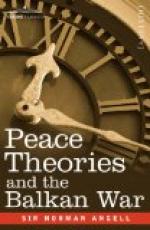And so with all the sophistries and illusions by which the war system is still defended. If the public as a whole had to follow all the intricacies of those marvellous diplomatic combinations, the maze of our foreign politics, to understand abstruse points of finance and economics, in order to have just and sound ideas as to the real character of international relationship, why then public opinion would go on being as ignorant and mistaken as it had been hitherto. But sound opinion and instincts in that field depend upon nothing of the sort, but upon the emergence of a few quite simple facts, which are indisputable and self-evident, which stare us in the face, and which absolutely disprove all the elaborate theories of the Bellicist statesmen.
For instance, if conquest and extension of territory is the main road of moral and material progress, the fundamental need which sets up all these rivalries and collisions, then it is the populations of the Great States which should be the most enviable; the position of the Russian should be more desirable than that of the Hollander; it is not. The Austrian should be better off than the Switzer; he is not. If a nation’s wealth is really subject to military confiscation, and needs the defence of military power, then the wealth of those small states should be insecure indeed—and Belgian national stocks stand 20 points higher than the German. If nations are rival units, then we should benefit by the disappearance of our rivals—and if they disappeared, something like a third of our population would starve to death. If the growth and prosperity of rival nations threatens us, then we should be in far greater danger of America to-day than we were some 50 years ago, when the growth of that power disturbed the sleep of our statesmen (and when, incidentally, we were just as much afraid of the growth of that power as we are now afraid of the growth of Germany). If the growing power of Russia compelled us to fight a great war in alliance with the Turk to check her “advance on India,” why are we now co-operating with Russia to build railroads to India?
It is such quite simple questions as these, and the quite plain facts which underlie them which will lead to sounder conceptions in this matter on the part of the peoples.
It is not we who are the “theorists,” if by “theorists” is meant the constructors of elaborate and deceptive theorems in this matter. It is our opponents, the military mystics, who persistently shut their eyes to the great outstanding facts of history and of our time. And these fantastic theories are generally justified by most esoteric doctrine, not by the appeal to the facts which stare you in the face. I once replied to a critic thus:—




